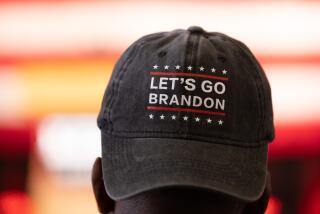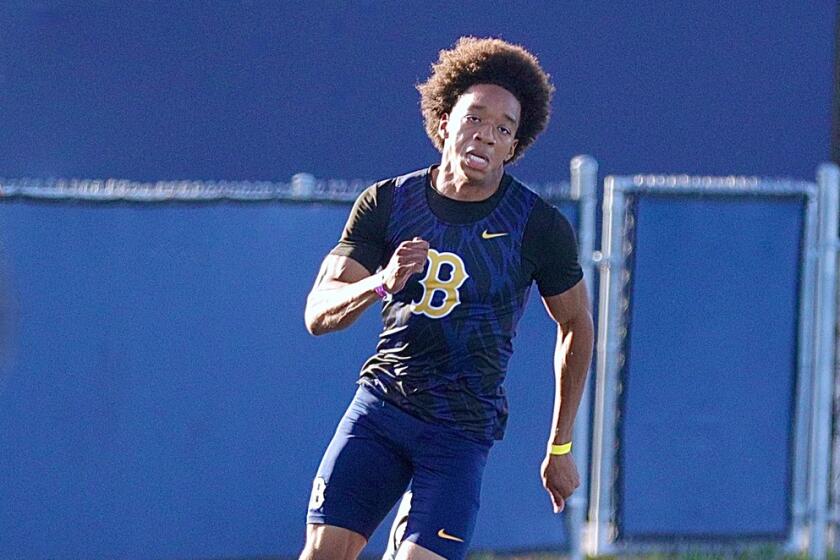Lance Armstrong quits Livestrong post, loses endorsement deals
- Share via
Nike, Anheuser-Busch and other companies on Wednesday said they will end their endorsement deals with cycling great Lance Armstrong, a week after the U.S. Anti-Doping Agency released a report detailing allegations of widespread doping use by Armstrong and his teams.
Nike has remained loyal to some of its stained sports celebrities in the past, and it had sponsored Armstrong since 1996. But the powerful shoe and sports apparel company dumped Armstrong as an endorser, effective immediately.
“Due to the seemingly insurmountable evidence that Lance Armstrong participated in doping and misled Nike for more than a decade, it is with great sadness that we have terminated our contract with him,” Nike said in a statement. “Nike does not condone the use of illegal performance-enhancing drugs.”
Anheuser-Busch announced it will end its deal with Armstrong as a Michelob Ultra spokesman at year’s end. RadioShack, which sponsored Armstrong’s cycling team, said through a spokesman Wednesday that it “has no current obligations with Lance Armstrong.” Additionally, Trek bicycles, a sponsor predating his run of Tour titles, ended its support, announcing it “is disappointed by the findings … in the USADA report.”
Also Wednesday, Armstrong stepped down as chairman of his cancer-fighting foundation, Livestrong.
“He is no longer a viable figure in a marketing platform for anyone moving forward,” said Paul Swangard, managing director of the University of Oregon’s James H. Warsaw Sports Marketing Center.
Swangard said the sponsors’ departures mark a stark close for a “once-in-a-generation figure” who emerged from an obscure sport to become one of the top 20 endorsers in sports.
One expert estimated Armstrong will suffer $30 million in lost earnings from endorsements, along with missed public-speaking fees.
“It was a great and long ride for him,” Swangard said. “But I think the ride’s over.”
Armstrong, 41, became a worldwide hero by overcoming testicular cancer and winning a record seven consecutive Tour de France titles from 1999 to 2005.
Although he was tailed by accusations that his victories were fueled by performance-enhancing methods, Armstrong cited hundreds of clean drug tests and denied ever cheating to win.
Armstrong’s agent and spokesman did not immediately respond to questions from The Times on Wednesday.
Last week’s voluminous USADA report alleged that Armstrong relied on the use of banned performance-enhancing substances, such as energy-boosting EPO and testosterone, while also blood doping.
The agency stripped Armstrong of his seven Tour wins and banned him from competition for life. The International Cycling Union could issue a ruling this month.
Fifteen of Armstrong’s former U.S. Postal Service and Discovery Channel teammates, and 11 other witnesses, provided damning statements in the USADA report. They included George Hincapie, who rode alongside Armstrong in each of his seven Tour victories, and alleged that the champion cyclist encouraged teammates to dope as well.
Nike stood by Lakers star Kobe Bryant when he faced sexual assault charges in 2003 and kept its endorsement deal with golfer Tiger Woods after his adultery scandal.
“This is different,” said David Carter, a sports business and marketing expert at USC’s Marshall School of Business. “Athletes have to have respect for competition and have integrity. This was compromising the very essence of sport, of fair competition.”
Said Swangard: “Nike was never in this with Lance because padded shorts were flying off the shelves. That relationship was built on Lance’s story and cultural identity, building a philanthropic brand that resonated all over the world.”
In stepping down as Livestrong chairman, Armstrong said he wished “to spare the foundation any negative effects as a result of controversy surrounding my cycling career.”
Livestrong, known by its distinctive yellow wristband, in August said donations and support of its foundation sharply increased after Armstrong announced he was giving up his fight against USADA and would not participate in an arbitration process.
“This organization, its mission and its supporters are incredibly dear to my heart,” Armstrong said in a statement. “It has been a great privilege to help grow it from a dream into an organization that today has served 2.5 million people.”
Livestrong was founded in 1997 and has raised nearly $500 million to support cancer patients. Armstrong will remain on the charity’s board, the foundation said. Nike will continue to support Livestrong.
Removing him as the head of the organization best illustrates the damage inflicted upon Armstrong’s reputation, USC’s Carter said.
“If he can’t be associated as the face of his foundation because he’s too much of a drag, what company can he promote?” Carter said. “He’s not an active athlete.
“There’s not a shot at redemption unless he takes accountability for what all these people are saying about him. If you’re going to remain obstinate, people are not going to embrace you.”
The Armstrong camp has resigned itself to the likelihood the public will be divided. Some will believe Armstrong’s denials of doping, others will acknowledge doping was part of cycling’s culture and some will admire his support of the fight against cancer.
“He transcended the sport,” Swangard said. “While other sports survive when cheating athletes are found out, there won’t be any amount of ink used to discuss who will win the Tour next year. That’s the sad reality.”
Twitter: @latimespugmire
More to Read
Go beyond the scoreboard
Get the latest on L.A.'s teams in the daily Sports Report newsletter.
You may occasionally receive promotional content from the Los Angeles Times.











